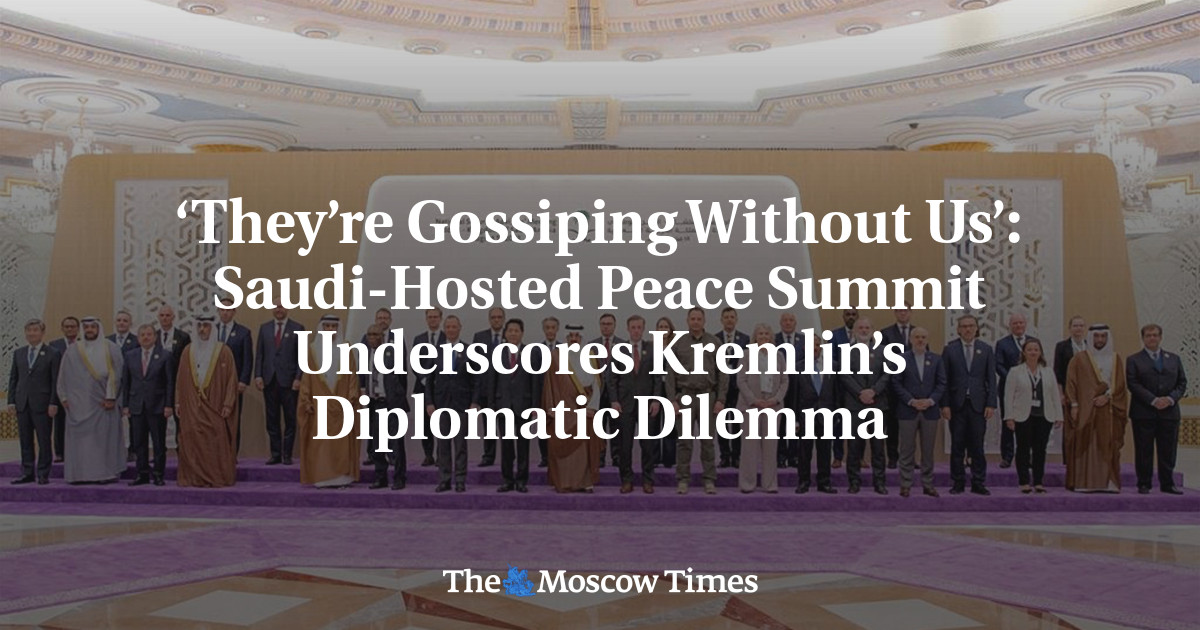
Russia’s absence from the Saudi-hosted summit to find a peace framework for the war in Ukraine exposed the Kremlin’s vulnerabilities despite the fact that no final joint statement or document was signed, four current and former Russian officials familiar with Russia’s diplomacy admitted to The Moscow Times.
The weekend summit in Jeddah, Saudi Arabia was attended by delegations from more than 40 countries. Among them were representatives from Ukraine’s allies in Europe and the United States, as well as from India and Brazil.
Even Beijing, which initially did not intend to participate and which the Kremlin counts as its most powerful ally, agreed at the last minute to send a representative.
Russia was not invited to attend, just as it was not invited to previous negotiations in Copenhagen.
All four officials, who spoke to The Moscow Times on condition of anonymity, stressed that neither Moscow nor Kyiv is yet ready to negotiate despite the summit in Jeddah.
The event exposed several challenges for Russia, mainly that of Ukraine’s attempt to find ways to engage not only its Western allies but also the countries of the Global South — which generally support Ukraine’s territorial integrity and independence — while isolating Russia from dialogues, one Russian diplomat said.
“Kyiv’s goal is to make these countries if not allies, then partners. And then if a general consensus is reached, Ukraine will try to deepen it and raise more sensitive issues to build such a consensus,” the diplomat said.
“We will have to find some ways to respond to Ukraine’s new tactics. Because no matter how much we say that the majority of the world is with us, no one has recognized the annexation of not only the Donetsk, Luhansk, Zaporizhzhia and Kherson regions, but even Crimea,” an insider close to the Kremlin told The Moscow Times. “This is of course what Kyiv will play on now, to isolate Moscow as much as possible.”
“The fact that we’re not there is naturally unpleasant for us. As is the fact that they’re gossiping without us. If that’s the case, then you can figure it out yourselves — but you cannot solve it without us,” a former high-ranking Russian diplomat told The Moscow Times.
He insisted, however, that important agreements are not reached at such major summits with many international delegations.
Before the summit, Russian officials said that Moscow would closely follow the meeting and hoped that BRICS countries would inform it of the outcome.
Following the meeting in Saudi Arabia, Russian officials and MPs sought to accuse the West of trying to guarantee Ukraine’s security at the expense of Russia’s interests, and boasted that Ukraine’s attempt to isolate Moscow and unite the Global South against it had failed.
Moscow itself has made efforts to court countries in the Global South as it has faced isolation from the West, including by holding a Russia-Africa summit in St. Petersburg in late July.
“Moscow would benefit from holding its own summit on seeking negotiated settlement in contrast to Kyiv’s initiative… But the Kremlin’s second problem is that it is not yet ready to make the slightest compromises in the talks,” another Russian diplomat told The Moscow Times.
He said that during the summit, the Kremlin only reiterated the same demands that it had made at the beginning of the war with Ukraine.
“Russia is not a part of the negotiations not because it is not a participant in this summit, but because it is not ready to compromise and give in,” the diplomat said.
He noted however that the same goes for Ukraine.
“Zelensky’s formula is actually a capitulation to Russia, which is unacceptable. If we are looking for a compromise, there should be flexibility on both sides,” the diplomat continued, referring to Kyiv’s insistence that it will not accept any peace resolution without the full withdrawal of Russian troops from Ukraine.
Boris Bondarev, a former member of Russia’s mission to the United Nations in Geneva who resigned in protest of the war, told The Moscow Times that the future of negotiations, and more importantly of the war itself, will be determined on the battlefield.
Until one of the opposing sides runs out of capacity to keep fighting, he said, no peace talks can take place, as neither side will be interested in holding them.